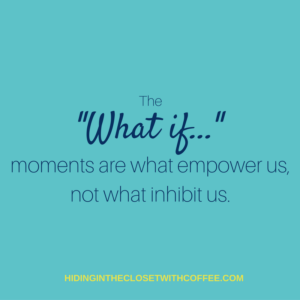Drowning in “What Ifs”
I used to think admitting that I had anxiety was like revealing a dirty secret. Now I wonder if things would have been different if I had agreed to taking medication for anxiety earlier in life. Would I have handled situations with more grace? Would I have been more willing to take risks? Hindsight may be 20/20, but what has stopped me in my tracks more than anything else is worry. I have always been a “worrier” and I am not sure when it happened, but somewhere in my childhood that amount of worry was just enough to warrant a curse: I have anxiety. My whole life I have been drowning in “What if…”.
What if… I don’t make the right decision?
What if… something happens to him on his way to work?
What if… I don’t know what to say in the middle of a presentation?
What if… I leave them alone for a bit and something happens?
The amount of my brain power that is sucked up into the world of “what ifs...” would be shocking to a “normal” person. During a particularly difficult time in my life, I sought out treatment in the form of Cognitive Behavior Therapy. I hoped I could learn and apply tools that would make the need for medication unnecessary. While that wasn’t the outcome, I did walk away with some great strategies. The one that sticks with me the most is the simple phrase, “What’s the worst thing that could happen?”
Usually, the answer to that question isn’t tragic, life threatening, or even that embarrassing. I can acknowledge that reality, but it still isn’t enough to quiet the worrisome voice in my head.
“Anxiety” acts as third person in my marriage: it’s me, Paul and Anxiety. Luckily, I am married to one of the most patient and laid back people on the planet. Opposites attract, right?! This isn’t to say that my anxiety hasn’t caused some hardships for us. We go through the typical cycle – he tries to “fix” it, rationalize my anxious thoughts, and supports like crazy. He deserves a gold star and yet, he doesn’t see it that way. He encourages me to trust my gut and insists I slow down. If it was just that easy.
If it were just that easy. “Anxiety” acts as a dominate feature in my parenting. When our kids were young, I could be crazy with anxiety. I had an excuse: MOTHERHOOD. New moms are supposed to be anxious, worry about everything and question their every move. Now my kids are older and my anxiety is a different sort of demon. Now there is a whole “big, bad world” out there that I send them out into every day. Seriously, watching them walk to the bus stop is a humbling moment.
I hear the words that come out of my mouth echoed in their voices:
What if…I cannot fall asleep?
What if… I don’t understand my homework?
What if…I have to sit by him on the bus?
What if…she decides not to be my friend anymore?
What if…something happens to you and you don’t come home?
Like all good mothers, I want to spare my children from the traits that weigh me down – like anxiety – and emulate those I am proud of: humor, kindness, “big feelings” (hey, they aren’t all bad). It’s almost as if I have been tallying all the times my kids express worry and measuring it against some invisible scale waiting to declare “Yup, they have anxiety.” Why?
I hear those “what if…” words, the words that are almost like a mantra for me, come out of their mouths and I automatically assume the worst: they have anxiety. Here’s the problem with that: worrying does not equate to full blown anxiety.
The other night at the dinner table we were discussing the anxious feelings our kids were experiencing during the first month of school. That’s when my husband, who is quiet at times, downright hilarious at others, and doesn’t discuss “big feelings” as freely as I do, stopped our conversation.
He explained to our kids (and to me) that anxiety has to be apart of each of us. It is an ingrained human reaction-think fight or flight. Our bodies are designed to feel anxious because of the physical reactions we need. We need the heightened senses and raised heart rate because they help us to make decisions. This anxiety is what we harness to do the hard things. Without it, we are paralyzed, unable to make choices. He reminded us (okay, me) that it is ridiculous to expect or even want to avoid every anxious feeling. We NEED that feeling and need to harness it. When anxious feelings arise, it’s all about how we react to it.
The “what if…” moments are what empower us, not what inhibit us. We can harness the strength of the “what if…”, for it is in those moments we are given choice. And within that choice is power!
This revelation of viewing the “what if…” moments as a time of choice and empowerment will be a hard habit for me to take on. However, I can help my kids to look at those anxious feelings we experience as normal, necessary and empowering. And that is a great gift.